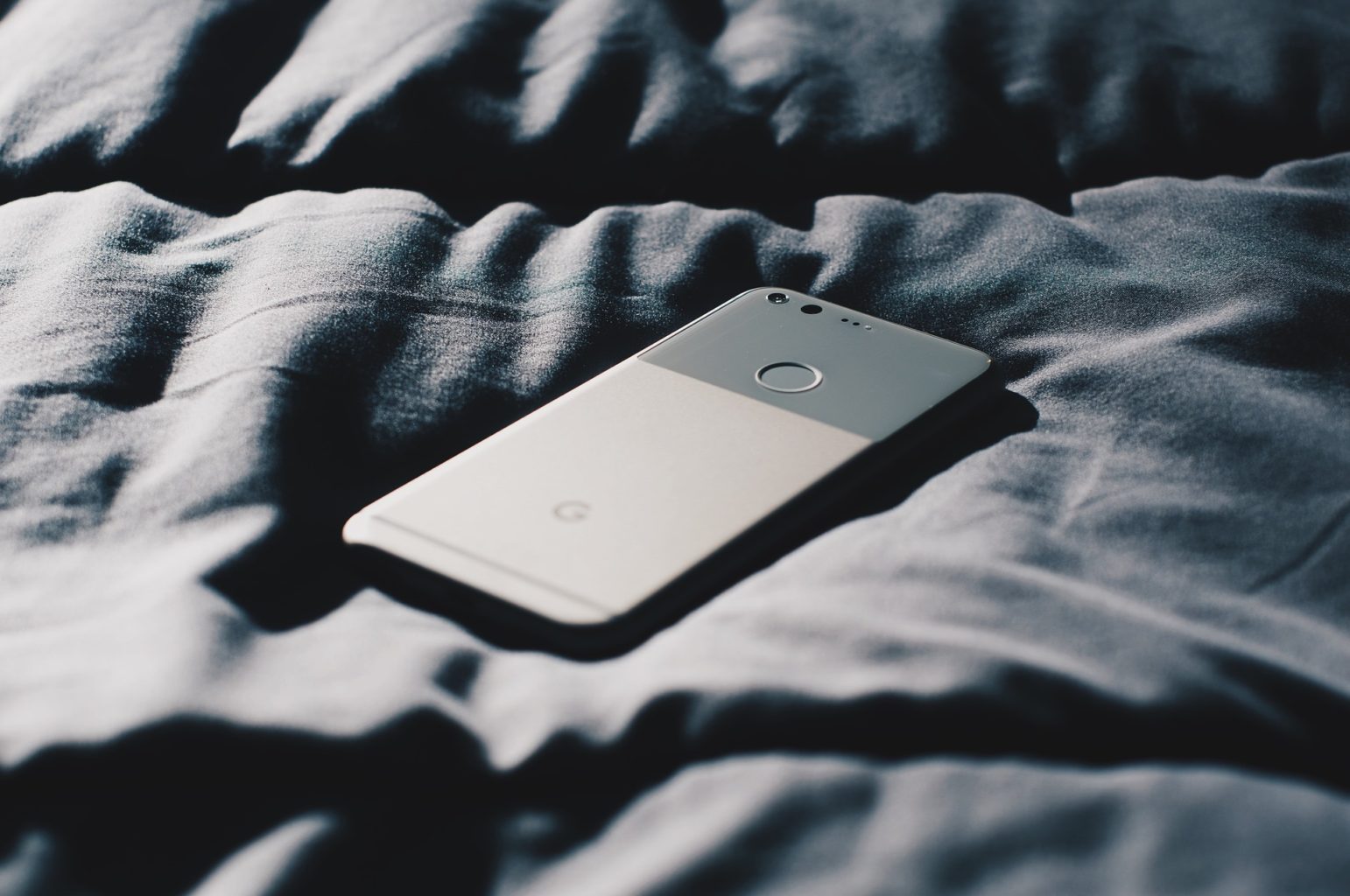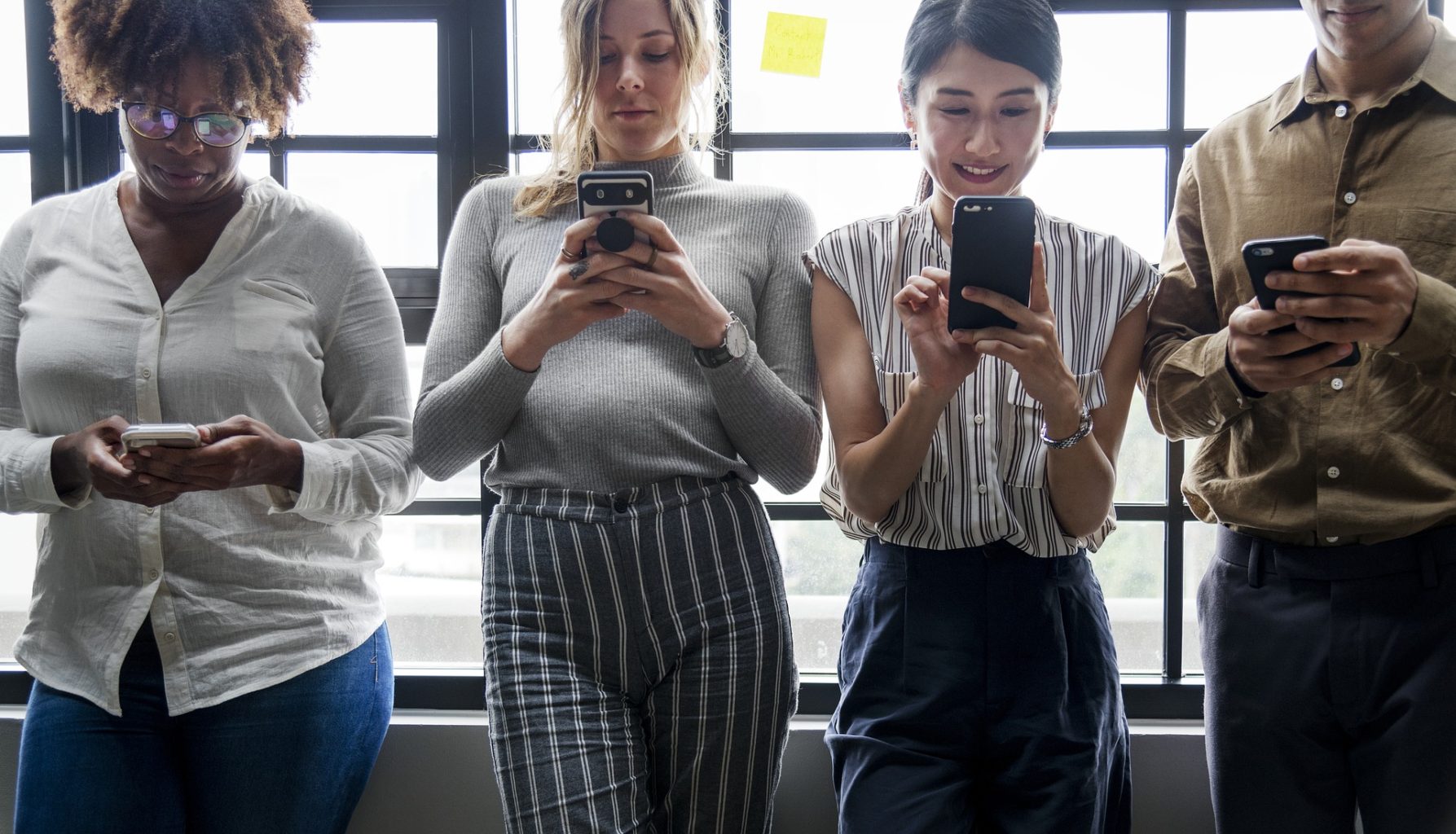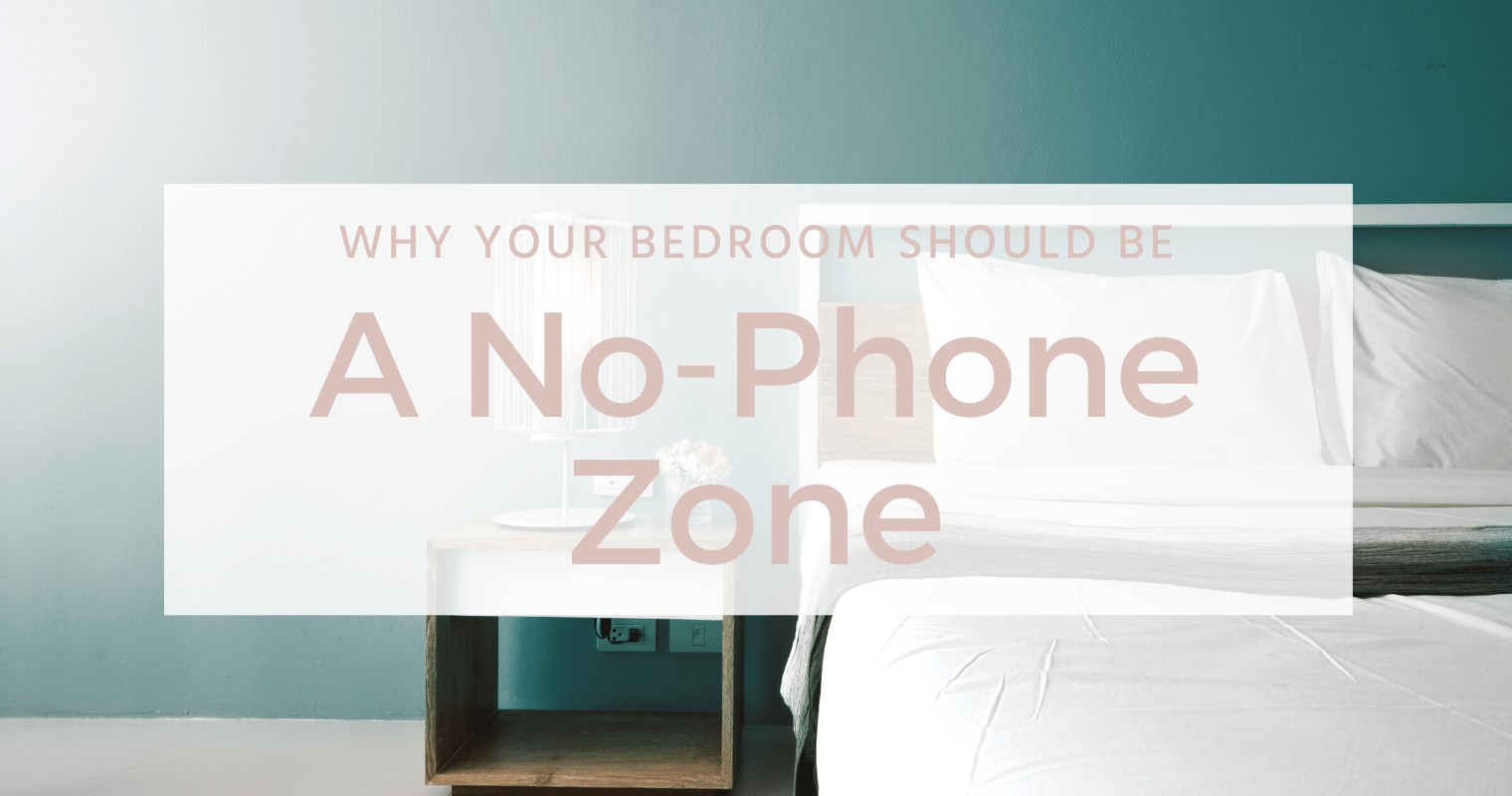This post may contain affiliate links, meaning at no additional cost to you I may earn a small commission when you click a product or company link. As an Amazon Associate I earn from qualifying purchases.
Is it bad to sleep next to your cellphone? It might not be “bad,” per se, but if you stop sleeping with your phone next to your bed you just might end up happier and healthier, sleep better, and improve your relationships. Curious? Read on to learn more!
Table of Contents
1. You’ll sleep better with your phone in another room

In 2016 scientists analyzed the available studies on mobile devices and their effect on children’s sleep. The analysis indicated a strong correlation between access to devices overnight (even if the devices weren’t used!) and sleep quantity and quality.
Their conclusion was that phones in children’s rooms resulted in “inadequate sleep quantity, poor sleep quality, and excessive daytime sleepiness.”
The mere presence of a smartphone in the same room has profound effects on the brain.
We all know how important sleep is for children and their development, and it’s pretty important for us grownups too. This study indicated similar effects on adults’ sleep and daytime sleepiness.
What happens if you sleep with your phone next to your head?
In addition to the psychological factors at play, it’s possible that you’ll see an effect on sleep because of increased brain activity.
Ever have trouble falling asleep because your mind is racing? A 2011 study showed an increase in brain glucose metabolism (an indicator of brain activity) from cellphone signals near a person’s head.
So moving your phone’s resting spot may just affect your rest. I personally noticed that my sleep overall became better and more restful when I stopped sleeping with my phone by my bed.
Here are some ways instituting a “no phones in the bedroom” rule can improve everyone’s sleep.
You’ll fall asleep faster

Ever get ready for bed because you’re exhausted and then waste the next hour scrolling? *Raises hand.* Yep, I’ve been there too.
It’s so easy to get lost in our phones, especially when apps like Facebook are designed to be addictive.
And even after you put your phone away, the fact that you used a light-emitting device before bed can affect how quickly you fall asleep. Blue light tricks your brain into thinking it’s daytime and you should be awake.
This study on the effects of using e-readers at bedtime showed significant effects on sleep quality.
But chances are blue light is only a small part of the problem. The bigger issue is the brain alertness that comes about from using social media, online shopping, and other interactive phone applications at bedtime.
Ideally, you’d put your devices away two hours before bed. Can’t say I’ve mastered that one yet… Two hours seems like an awfully long time, but I’m seriously thinking about trying it to see if it has positive effects on my sleep.
How about saving those two hours for being with your family? Or reading an actual physical book?
Try using a multi-device charging station in a central location for the whole family instead of sleeping with your phone next to you. It will keep you from wasting time on the phone instead of shutting off the light and going to sleep.
You’ll go back to sleep faster in the middle of the night

Ever wake up in the middle of the night, check your phone to see what time it is, and get distracted by new notifications? If your phone isn’t in the room with you, you won’t be tempted by those notifications, and you’ll be able to go right back to sleep.
Checking your phone when you wake up turns your brain back on and makes it difficult to go back to sleep.
When my first child was still a nursing baby, I used to take my phone into his bedroom to keep myself occupied while I nursed him in the middle of the night. Falling back asleep afterward was a struggle, and I spent my waking hours even more exhausted from lack of sleep than I think I otherwise would have been.
With my daughter, I changed my habits and closed my eyes while she night nursed. Sleep (and daytime waking hours) were vastly better.
What about checking the time? Or setting an alarm for the morning? Try (gasp!) an old-fashioned alarm clock or a wristwatch. I keep my Fitbit on the nightstand overnight.
Should you put your phone on airplane mode when you sleep? If you have to use your phone as an alarm, this is a good option.
Airplane mode will turn off your phone’s cellular and wireless radios, so you won’t get any internet access or notifications until you turn airplane mode off in the morning.
Your sleep quality will be better
It might not just be the easy access to your phone that affects your sleep; it may be the phone’s communication technology itself.
This small study in Germany seems to indicate that the radio emissions from cellphones affect the structure of a person’s sleep. Their consistent finding was a change in REM sleep.
However, the study’s findings aren’t exactly clear. While sleep was affected, the study was small, and it wasn’t exactly obvious what the results meant.
Our phones do, however, put us in a constant state of alertness, so it stands to reason that putting the phone away at bedtime, where your brain can detach from it, will help you to get better sleep.
2. You may reduce your risk of disease

Cancer
Do mobile phones cause cancer? There’s a lot of controversy on this subject. Studies show that prolonged exposure to the radiation emitted by cellphones causes tumors in rats, but scientists can’t agree on how or if this data applies to humans.
Joel Moskowitz, on the other hand, professor at University of California, Berkeley, and director of its Center for Family and Community Health, thinks there’s a definite link between cancer and cellular radiation. He has dedicated a lot of research to electromagnetic radiation safety.
You can find his list of key studies here. He has also compiled a “Spin vs. Fact” document here on how to interpret the rat-human studies.
Moskowitz’s February, 2019, talk on “Cell Phones, Cell Towers, and Wireless Safety” raises several relevant points.
- The World Health Organization’s (WHO’s) International Agency for Research on Cancer (IARC) in 2011 pointed to an increase in glioma (malignant tumors of the brain and spinal cord) as evidence that radiofrequency electromagnetic fields are potentially carcinogenic.
- The risk is even higher for children, whose brains absorb twice the radiation as an adult brain.
- As our cellphones have moved from “dumb” phones to smartphones, the antenna has also moved to the bottom of the phone, raising the risk for neck and thyroid cancers.
Does sleeping with your phone by your bed increase your risk of cancer?
While many of these risks increase when you’re actually using the phone to make a call, there’s some amount of risk whenever the phone is on and connected to a network. The farther the phone is from your body, the lower the risk.
You may have heard the term “SAR.” What is SAR mobile phone radiation? Your body absorbs radio-frequency (RF) energy from your phone. The amount of energy your body absorbs from a given phone is referred to as the Specific Absorption Rate, or SAR.
Every phone has a SAR rating, because every phone emits RF energy that your body absorbs. So it makes sense to keep your phone somewhere other than your nightstand while you sleep.
DNA damage and other health effects
Moskowitz’s talk on the risks of electromagnetic radiation also points to DNA damage from cellular radiation in the brains of rats and mice, heart disease in rats and lower birth weights in rats. He also references the following in humans:
- sperm damage
- male infertility
- miscarriage
- preterm birth
- headaches
- hearing problems
- poor memory
- ADHD
- a potential link to autism
- fatigue
- insomnia
- tinnitus
- and more
It’s worth keeping your phone somewhere else while you sleep if it reduces your risk of these health effects.
3. You’ll start to curb device addiction

More and more we are becoming addicted to our phones. We check them compulsively even when we don’t need to. We focus on them rather than the people and situations around us.
One way to break an addiction to your phone is to stop making it so available all the time.
The first time you sleep without your phone next to your bed (or under your pillow!), it might feel weird. It might feel like a part of you is missing that you can’t survive without.
But forcing yourself to go without your phone for a period of time can be a good thing. Being without it will start to break down your dependency on it, and you may find that you use it less during the day as well.
I’ve personally found it to be true that as I systematically tackle the little, unnecessary pieces of my device dependence, I depend on it less and less. I’m able to be more intentional with my life and waste less time on things that don’t really matter in the long run.
4. Your kids will be better off without their phones overnight

When I was a teen, we didn’t have cellphones, but I got myself into a lot of trouble just taking the family cordless phone into my room overnight. Now, of course, the danger with phones is not only with who you’re talking to or when you’re talking to them. It’s with all the other things you can access from a smartphone or tablet.
Unlimited access to electronics can profoundly affect our children in negative ways, so I’m a huge proponent for monitoring their access and setting safe screen time rules.
One way to keep on top of and monitor their phone usage is to have set times and places where phones are not allowed, such as the dinner table and bedrooms. It will go a long way toward reducing screen time.
If you set a family rule that bedrooms are no-phone zones, your children will sleep better and experience the other benefits of detaching from their phones overnight.
5. You’ll reduce your stress and increase your productivity

You probably already know that checking your phone first thing in the morning isn’t the most ideal way to start your day. Maybe it’s stressful news stories or a message from a family member that you’d be better off not thinking about as you’re getting ready for the day.
Maybe you struggle with wasting time scrolling Facebook in the morning. Not only does social media cut into time when you could be productive, you’ll also start the day comparing yourself to everyone in your newsfeed.
Related: What Happened When I Deleted the Facebook App From My Phone
This article is a great description of why you don’t want to start the day by staring at your smartphone.
If your phone isn’t right next to your bed, it will be a whole lot easier to just get up and be productive right away rather than wasting time scrolling. You will probably be happier and less stressed as a result.
6. You’ll connect better with your spouse
In 2016, condom brand Durex conducted a social experiment. They took 6 couples on a holiday and require half of them to turn over all of their digital devices.
Those who went without technology connected better and enjoyed their time together better. Those who kept their phones realized by the end of the holiday that what they thought was an advantage–getting to keep their devices with them–may have actually caused them to miss out on fully enjoying just being together.
I know I’ve been guilty of paying more attention to my phone than to my husband. And it definitely doesn’t feel good when it goes the other way.
Keeping the phones out of your bedroom means you’ll have more attention to just enjoy each other… and use your time before sleep for something other than staring at your phones. (Wink wink.)
What do you think? Are you going to try putting your phone somewhere else overnight?

If you found this post useful, please share to Pinterest!

